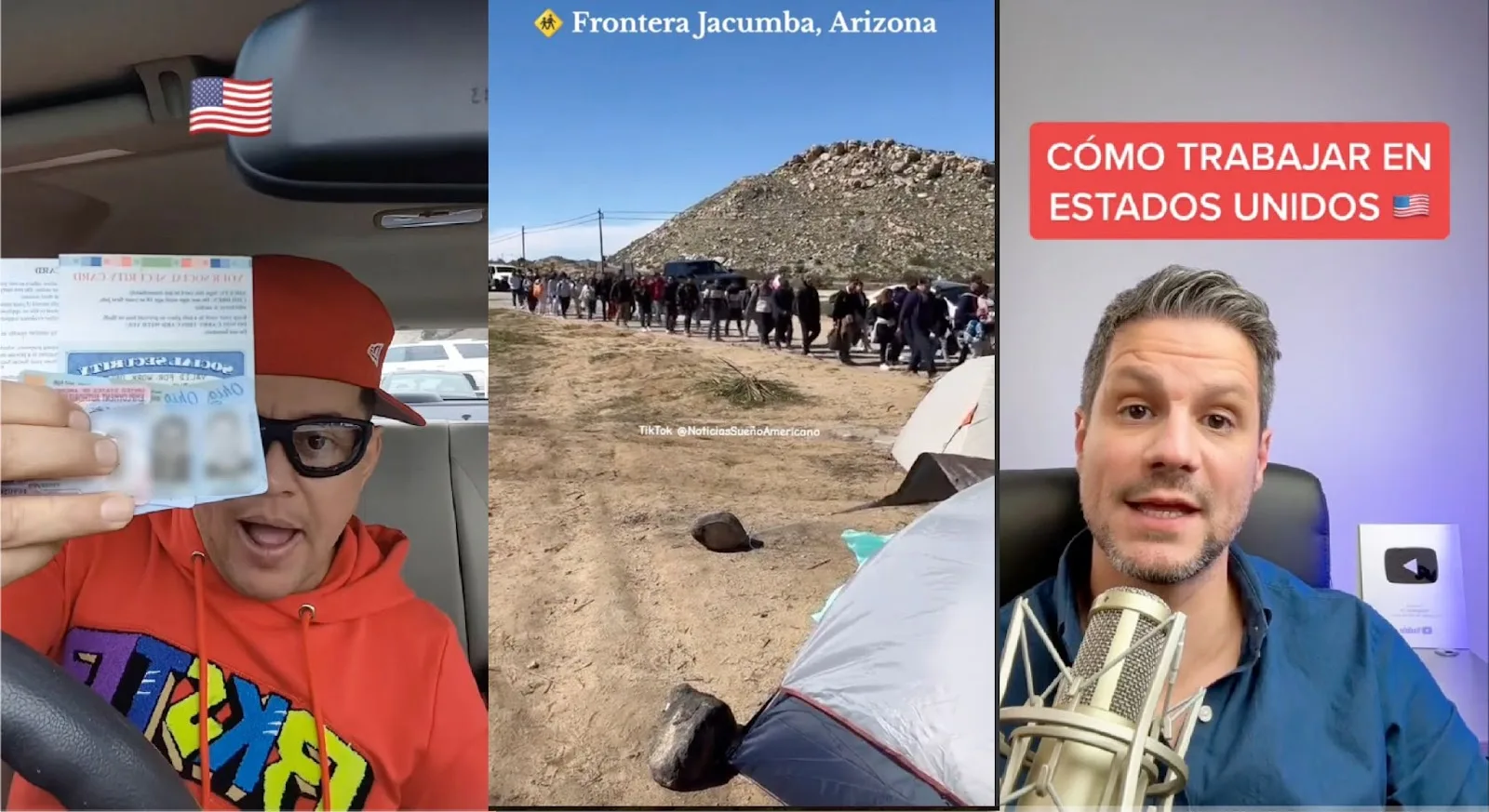TikTok influencer Rafael Jerez did not identify as a lawyer or as a social worker. Yet, he claimed he could help migrants navigate important immigration issues. And he had a big audience: by the time he deactivated his account he had 1.6 million followers.
“You hit the United States! And you don’t know how to get through the day with all your documents, your immigration status? Well, brother, I’m going to help you,” Jerez said in a video published on March 26, which he has since deleted for unknown reasons.
He is holding a social security card, two Ohio-issued driver’s licenses and a work authorization card in his left hand as he tells his audience he can help them with their immigration troubles. In the video, he sits in a car wearing black-rimmed glasses, a red hoodie and a baseball cap. He is speaking rapidly, calling the audience members his “brother.”
“I made it very simple,” he tells his viewers. “In no time, we are here to help you and to serve you, without anyone deceiving you […] a thousand blessings, I say bless.”
Before his account was deactivated, his most popular video garnered as many as 4.2 million views. Jerez was one of many influencers targeting migrants on TikTok and giving his audience often unfounded advice about the U.S. immigration system.
Migrants from Africa, Asia and across Latin America have told Documented that they came to the U.S. in large part because of videos they saw on TikTok that promised them a bright future if they made the journey. Influencers have also played a vital role in giving migrants information on how to cross several borders, and in some cases, influencers, many of whom are recent migrants themselves, have given migrants controversial and misleading advice on how to navigate their new lives in the U.S., including squatting in empty buildings.
Also Read: TikTok Videos Spread Misinformation to New Migrant Community in New York City
For many migrants who spoke to Documented, the videos they watched sold them a false dream about an easy and happy life in the U.S., they said. But despite their frequently negative experiences with social media, many migrants still spend much of their time on TikTok, being targeted by news influencers and self-anointed immigration experts like Jerez.
Documented reached out to Jerez on TikTok and WhatsApp for comment but received no response by the time of publication.
To better understand who some of the main players of this media ecosystem are and what they post about, Documented consulted with misinformation experts. We searched terms like “inmigración” or “Darién” on TikTok to identify accounts with a significant following (100,000 followers or more) to examine their reach and content further.
Among the many accounts that published content about immigration, Documented found three major categories of influencers online that catered to migrants: informal self-proclaimed experts like Jerez, licensed immigration lawyers, and accounts that claimed to be news sources for migrants.
We found that migrants are often given partial information ranging from outright misleading to incorrect information shared with good intent. They are also served clickbait that shows raw footage from the border, the migration trail through Central America and footage of migrants in the U.S. being rounded up by authorities with little to no context.
And while many licensed immigration lawyers are also on TikTok simply trying to spread helpful and legitimate information, some have become so visible that scammers have begun to impersonate them to tap into their vulnerable audiences.
Information voids
Recently arrived immigrants in the U.S. don’t have many news outlets to turn to for their information needs. And it is very hard to find helpful information about immigration policies online, Josephine Lukito, assistant professor at the University of Texas at Austin’s School of Journalism and Media, explained. Lukito, who studies misinformation in immigrant communities, says that this allows online content producers to swoop in and fill these gaps with information of varying quality.
“We call these sort of gap spaces ‘data voids,’ places where on the Internet you do not have a lot of information if you look something up,” said Lukito. “There are a lot of them online, but especially for the immigrant community. A really big one is around immigration and immigration policy, and part of that is because of the complexity of it.”
Also Read: He Found the American Dream on China’s TikTok, the Reality Was More Complicated
Lizet Echandia, 43, a Venezuelan national who has been in New York City since January 2024, has a current asylum application with the immigration courts. She said she used TikTok to navigate the journey to the United States as she traversed Central America.
“We get information about money exchange rates, which transportation to take,” she said. She learned from a video that Mexican officials charge extravagant amounts of cash to navigate from town to town, something she experienced herself when she got to the country and was told to pay 500 pesos, equivalent to $25 dollars, to avoid being sent back to the previous town. Echandia explained that other videos helped her avoid falling for scams from locals who take advantage of immigrants traveling the towns.
“It is like a brotherhood,” she said of the support the TikTok videos provided her.
However, she recognizes that not all the videos she found online were helpful. “There are many people in other countries and in the [U.S.] who give bad recommendations. They say that they will help you, but in reality they are trying to cheat you,” she said.
Echandia, who resides in a shelter in Manhattan with her son, said she came across videos where immigrants take advantage of those arriving in the U.S. by guaranteeing a place to stay. “[They] say ‘I will wait for you here’ and then they charge you to take you to a [City shelter] hotel, as if they were the landlord,” she said, adding that people fall for those scams because they do not know that there is no charge to access a city-run-shelter. “It’s the same immigrants that do it.”
She has also come across videos where content creators charge money for IDs, apartment listings, car plates, and driver’s licenses. “Some scam you and they never show up. Others show up but give you false documents” she said.
“If social media can be good, then it can also be just as bad.”
If you are an immigrant living in the United States or a migrant hoping to enter the country and trying to figure out what’s the next step in your visa process, there’s not a lot of documentation, especially in an immigrant’s preferred language, Lukito said.
This is where Jerez found his niche. He started targeting migrants trying to set up appointments with border patrol using the CBP One portal, an app that the Department of Homeland Security has required the vast majority of migrants to use since May of 2023. The app requires asylum seekers at the Southern border to wait outside the U.S. for their appointment with border control instead of crossing the border and turning themselves in to the authorities.
On TikTok, Jerez claimed he could get migrants an appointment quickly, when in reality, immigration lawyers Documented spoke to said that migrants may wait weeks if not months to get their appointments. One lawyer also told Documented that not using CBP One to book an appointment could result in migrants losing their asylum case.
Also Read: Meet SmartLINK, the App Tracking Nearly a Quarter Million Immigrants
A report from Amnesty International in May 2024 documented a litany of issues with the app, including being only available in English, Spanish, and Haitian Creole and suffering from various technical problems, like crashing or not allowing migrants to upload photos.
These technical and linguistic issues make it easy for someone like Jerez to swoop in with information around the process. A Documented analysis of 1,134 videos Jerez posted from his two accounts @smikrafa88 and @rafaelsmikjerez showed that 490, or 43%, were tagged #cbp or #migrantes. The @smikrafa88 TikTok account was deleted shortly after the election, but Documented was still able to analyze it.
In one video he told his viewers to book an appointment on the CBP One app at a specific time of day, to have the best chance at an early appointment. In many other videos he encouraged viewers to get in touch with him if they want more specific help. In a third video he claimed that “We are [getting] the CBP One appointments in record time.”
But immigration lawyers told Documented that individuals have little to no control over when their appointments will be scheduled. While a portion of appointments are given to people on a “first come, first served” basis, some appointments get doled out at random. They also told Documented that giving out legal advice without being licensed is illegal in many regions in the U.S.
Julio Oyhanarte, an immigration lawyer and legal influencer on TikTok, says that he’s aware of the issues that misinformation can cause for immigrants trying to obtain legal status in the U.S.
As an immigrant to the U.S. who practiced law in Argentina before graduating from law school in Los Angeles, he began posting videos about immigration laws and news in Spanish on TikTok in 2020. His first TikTok videos, which he posted under @inmigracion, immediately went viral, and he has steadily gained a large following, first among immigrants in the U.S. and then increasingly from people around the world. He currently has 6 million followers on TikTok (and 15 million across various accounts and platforms) and posts 1 to 3 times a week.
Also Read: Latin American Migrants Use TikTok to Share Their Journeys to the U.S. Border
He says the social media platforms tend to push content posting simple and easy solutions for complicated problems. “Not only Tiktok, but also reels on Meta and shorts on YouTube, they’re pushing you to speak and say something in less than 60 seconds, and that’s a big challenge when you need to give complex information,” he said. “For the sake of virality [influencers may be pushed to] speak in really simple terms, and that can be misleading, and you know, that can hurt people,” he continued.
Still, for some migrants, even this partial and at times misleading kind of information has proven useful, such as learning about the existence of CBP One in the first place. Many of Jerez’s videos also include testimonials from people who said he helped them navigate and receive CBP One appointments.
“Thank you for the information. God bless you very much,” said Indira Gomez, a commenter in a TikTok of Jerez explaining whether migrants can travel once they have a CBP One appointment.
Comments in his videos also show just how much of a demand there is for someone to answer the dozens of pressing questions migrants may have.
“Hello, good evening, can I register while in Venezuela and then when I get to Mexico do the CBPONE?” asked another TikTok user, @Franny, on the same video.
“Another question, in the traveler registration of the application it asks me to scan my passport, but if I don’t have one, what should I scan there?” asked @Rubi, another TikTok commenter.
When embarking on long journeys to the U.S. it can also be useful for migrants to watch videos to understand what they might expect. The account @migracionnoticias tries to fill that gap. It describes itself as “noticias sueño americano,” or “News of the American Dream,” and regularly posts raw, migration-related footage, including clips of migrants traversing difficult terrains, of them being apprehended at the border and of viral incidents of migrants being arrested in their new home.
It is the kind of footage that can convey what it’s like to make a journey to the U.S. but tends to lack context that a full-fledged news report might provide. One video, for instance, is simply titled “BREAKING NEWS! National Guard soldiers in Texas prevented more than a hundred illegal migrants from entering the United States in the state of Texas” without specifying where in Texas the video took place or what the encounter between the migrants and the National Guard represents. The video was just 18 seconds long and had 15.2 million views.
Another video is captioned “NEW YORK COLLAPSES DUE TO THE MIGRATION CRISIS! Send them back!” and “’Close the border!’ – Crowds of anti-immigrant New Yorkers came furious to protest in front of the ROOSEVELT HOTEL used as an arrival and accommodation center for immigrants arriving in New York. 
TikTok’s algorithm is geared toward making clips like these go viral, says Oyhanarte. Using words like “deportation” that bring about fear tend to make his videos go more viral, he says. He suspects that accounts like @migracionnoticias might make a good amount of money from TikTok through their platform’s rewards program if they can get enough followers and views. Documented reached out to an email address listed under the @migracionnoticias TikTok for comment but did not receive a response by the time of publication.
Ginny Nuñez is an immigration lawyer in New York specializing in humanitarian cases, largely working with refugees and asylum seekers. She is on TikTok herself and says that while it can be helpful to find some information online, it’s always best to consult a lawyer because every person’s case is unique, and the law might apply to different people in different ways.
“Unfortunately, there’s a lot of people selling this idea that they could just game the system and get CPB One appointments right away,” said Nuñez.
“I think the idea of asylum sounds like it’s much easier than it truly is,” she said. “It’s a lot harder than you would think to be able to obtain asylum.”
MethodologyDocumented downloaded the files and metadata for every video for the accounts of @rafaelsmikjerez, @smikrafa88, @inmigracion and @migracionnoticias in the fall of 2024. Using OpenAI’s whisper library Documented also automatically transcribed each video and did some basic topic modeling for each account’s transcripts to better understand what the videos may be about. If you want to use this methodology, please download the code here.
















